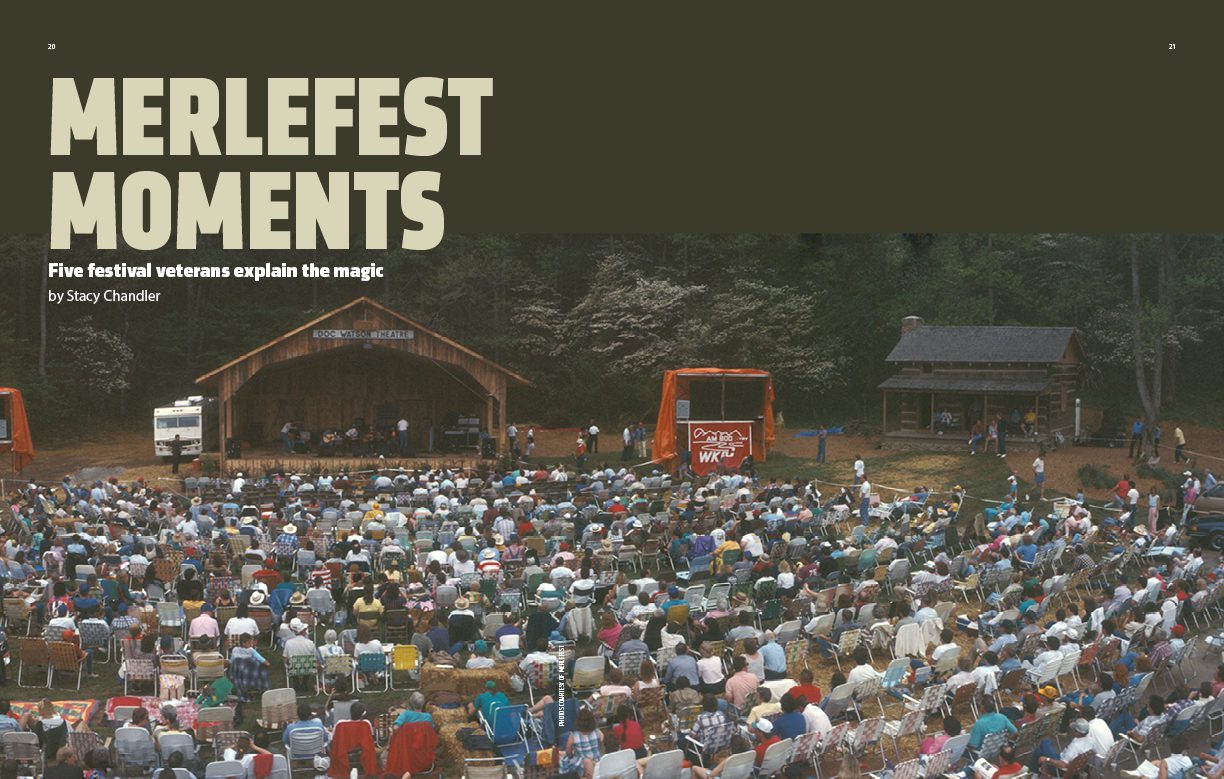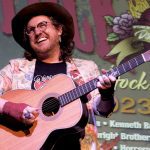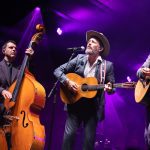JOURNAL EXCERPT: Five Festival Veterans Explain the Magic of MerleFest

EDITOR’S NOTE: As MerleFest gets rolling this week in Wilkesboro, North Carolina, we thought we’d share part of this story from our Spring 2022 “General Admission” journal about its history and why it’s so important to the performers who come back year after year. To read the whole thing, purchase the Spring 2022 issue in print or digitally here. Or better yet, subscribe to get this issue and those that come after, and to support the music journalism No Depression brings you in print and online all year long.
It’s hard to imagine now, with 13 stages and attendance that can top 80,000 fans across four days, but MerleFest has a very humble history.
The main stage, now a large wooden building outfitted with lighting rigs and large video screens, was once a flatbed trailer, and hay bales provided some of the audience seating. What started as a one-time fundraiser for improvements to the campus of Wilkes Community College in the foothills of North Carolina’s Appalachian Mountains, has evolved over 34 years into one of the premier roots music festivals in the country.
Bluegrass forefathers Earl Scruggs, Ralph Stanley, and even Bill Monroe played MerleFest in its early years, and country royalty including Dolly Parton, Marty Stuart, and Willie Nelson have drawn fans to Wilkesboro each spring since 1988. The Avett Brothers, Old Crow Medicine Show, and Rhiannon Giddens started out playing small stages in the middle of the day before returning a few years later as headliners.
Throughout the festival’s history, there’s been a family feel, and that comes down to the local community’s and the music community’s love for one family in particular: that of Doc Watson.
In 1987, when horticulture instructor Frederick William Townes IV, known to everyone as “B,” wanted to raise money to create themed gardens around Wilkes Community College’s campus, he went to the board of trustees. One trustee had connections to Doc Watson, who lived in nearby Deep Gap, and offered to make an introduction. Watson, they hoped, might be willing to play a concert to raise money for the project, which included a garden for the blind. Watson agreed, asking only that the garden for the blind be named for his son, guitarist Eddy Merle Watson, who had died a couple years earlier in a tractor accident at the age of 36.
After a few false starts with scheduling, the idea expanded to a two-day festival involving Doc and Merle’s musical friends, and in April 1988, they gathered for the first MerleFest — then called the Eddy Merle Watson Memorial Festival. The musicians who played on that flatbed trailer, or inside the college’s Walker Center theater, included Chet Atkins, Earl Scruggs, Tony Rice, Béla Fleck, Emmylou Harris, John Hartford, Grandpa Jones, Marty Stuart, New Grass Revival, and Doc himself.
Also on the bill for that first MerleFest were Sam Bush, Jerry Douglas, Peter Rowan, Joe Smothers, and Jack Lawrence, who were invited back for the second MerleFest in 1989, and the one after that. In fact, they’ve come back to perform every single year, keeping the festival connected to its roots and preserving that family feeling well into the festival’s third decade.
So, No Depression checked in with these five regular performers to explain what makes MerleFest — a homecoming in the mountains for locals and travelers alike each spring — so special. Read an interview with Sam Bush below, and buy a print or digital copy of the journal to hear from Douglas, Rowan, Smothers, and Lawrence and see photos from throughout MerleFest’s history.
SAM BUSH
“Just good down-home picking … ”
People tend to call MerleFest a bluegrass festival, which Sam Bush (and other regulars) will point out is only some of the story.
“Of course bluegrass is part of it,” Bush says, “but it’s what Doc would say is some just good down-home picking.”
Officially, MerleFest calls the music it presents “traditional plus” — another term coined by Doc — and describes it as “a unique mix of music based on the traditional, roots-oriented sounds of the Appalachian region, including bluegrass and old-time music, and expanded to include Americana, country, blues, rock, and many other styles.”

From left, Sam Bush, Peter Rowan, and Jerry Douglas on the flatbed trailer that was the main stage at the first MerleFest, in 1988. (Courtesy of MerleFest)
Bush is a regular at the vet set and the “Memories of the Watson Family” hour Saturday morning, as well as at the annual onstage gathering of mandolin superstars dubbed “Mando Mania,” and at his own headlining set Saturday night. And he’s a frequent guest with other musicians throughout the festival, some of them old friends, and some brand new.
Backstage, he says, “You’re gonna run into some of the other musicians that are playing there, and I know I’ve seen certain jam sessions pop up from people just running into each other — ‘Wanna come out and play on a number?’” That’s how he found himself on stage a few years ago with guitarist Tommy Emmanuel, who he’d never played with before. Bush’s friend and fellow MerleFest veteran Jerry Douglas was scheduled for a set with Emmanuel, and as the three chatted backstage, “Tommy says, ‘Hey, do you want to play a tune?’” Bush recalls. “So I just walked out and played a couple of numbers, and hadn’t planned on that.”
Even as MerleFest strives to be a homecoming for its veteran performers, there’s room for new voices, too, whether they’re onstage or in the audience. “One of the main reasons the festival endures is because they try so hard to involve youngsters — the tent for the little pickers, a dance tent,” Bush says. “It’s not just one age group that’s being appealed to here. And I believe that’s where some of their greatest success lies.”
Making young people feel welcome makes for a fun festival experience for families, but it also plants seeds for the future. “I know of some kids that have come away from MerleFest that got an instrument, want to learn to play — they got enthused about it there first,” he says. “If young people don’t come to the show or continue to play music, then of course we don’t have any new music in the future. So it’s important.”
Excited as he is for the future, though, Bush keeps the history of the festival, and the reasons behind it, firmly in mind on any stage he plays at MerleFest.
“Every year that I’m there, there’s a spot in my set somewhere where I just feel [Doc] and Merle go through me,” he says, his voice turning somber. “I was close with Doc and Merle, riding around with them, and that’s why you will hear me say, ‘Don’t forget about ol’ Doc and Merle, friends. That’s why we’re here.’”






